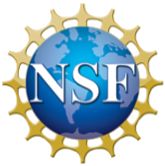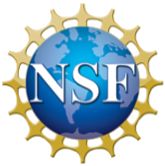Critical-Zone Collaborative Network NSF Program Solicitation
EXPIRED OPPORTUNITY
31 May 2019
News Source: National Science Foundation
NSF seeks proposals to establish an adaptive and responsive research network that supports investigations of the Earth’s Critical Zone.
Critical-Zone Collaborative Network
Program Solicitation
NSF 19-586
Note to Critical Zone colleagues from CZO PIs:
Please contact us about proposals, see info about NSF webinars
Full Proposal Deadline(s) (due by 5 p.m. submitter's local time):
December 02, 2019
Synopsis of Program:
NSF seeks proposals to establish an adaptive and responsive research network that supports investigations of the Earth’s Critical Zone. This network will consist of two components that will work together to advance knowledge, education, and outreach in this convergent science: 1) Thematic Clusters of fixed or temporary locations will conduct basic research on significant, overarching scientific questions concerning the structure, function, and processes of the Critical Zone. These U.S.-based Clusters could include existing observatories engaged in collecting environmental data, other monitoring locations that have been in operation for extended periods of time, and new sites that will support the scientific goals of the Cluster; 2) A Coordinating Hub that will oversee the compatibility and archiving of the data resulting from the Thematic Clusters, coordinate outreach and community-building activities, support the use of network facilities by outside researchers, and plan for infrastructure needs of the network.
This solicitation invites proposals for either of the two components: 1) Thematic Cluster or 2) Coordinating Hub. The Thematic Clusters will carry out interdisciplinary research on scientific questions and manage part of the network infrastructure; the Coordinating Hub will serve as the national center for the network. The infrastructure of the network will be accessible to other research teams pursuing research in the Critical Zone.
I. INTRODUCTION
The Critical Zone (CZ), which extends from the top of the vegetation canopy to the base of weathered bedrock is where fresh water flows, soils are formed, and most terrestrial life flourishes on Earth. The CZ is under unprecedented pressure because of contemporary human demands for food, water, land, and other resources that drive global economies. In the heterogeneous and complex CZ, multiple components of the Earth’s life-support system interact through connected processes that operate at different temporal and spatial scales. These coupled processes directly influence and are affected by lithology, climate, tectonics, anthropogenic activity, ecology, and cycles of water, nutrients, and other constituents. The Critical-Zone Collaborative Network will build upon the outcomes of the Critical Zone Observatories (CZO) to address significant interdisciplinary scientific questions at the regional and national scale, and develop predictive models of complex CZ phenomena. In order to achieve these goals, stimulate collaborations among new and existing CZ community members, and expand the CZO infrastructure to more diverse participation, the Critical-Zone Collaborative Network to be established will consist of several science-driven Thematic Clusters linked to a Coordinating Hub.
The Thematic Clusters (Clusters) will operate an array of CZ locations chosen on the basis of a unifying scientific theme. Each Cluster would ideally have several locations encompassing multiple watersheds that could facilitate investigations of environmental gradients relevant to the proposed research theme. The Network is expected to include Clusters with a variety of physical and environmental characteristics, such as lithology, climate, erosional and depositional settings, land use, and biota, that foster investigations showcasing convergent science and multidisciplinary teams. These Clusters could include existing CZOs or similar locations that have been actively gathering data for extended periods of time, other locations that leverage relevant data sets that have been collected previously, as well as new locations that will support the science theme.
The Coordinating Hub (Hub) will manage the standardization, archiving, and accessibility of the data generated by the Clusters, convene regular meetings of the Thematic Clusters, and plan for future research infrastructure needs of the network. The Hub will also help support national outreach activities and organize workshops that engage the larger CZ community. These activities are expected to enhance scientific progress within the domains of CZ research and to encourage the participation of a broad range of scientists from various disciplines, at different career stages, and from groups that are traditionally underrepresented in the sciences.
Additional documents that are useful descriptors of community planning related to this solicitation may be accessed through https://www.nsf.gov/geo/ear/programs/czo_moreinfo.jsp
II. PROGRAM DESCRIPTION
This solicitation invites proposals for either component of the Critical-Zone Collaborative Network: Thematic Clusters or the Coordinating Hub. Together, these components will serve as the basic infrastructure to facilitate interdisciplinary research into processes that govern Critical-Zone dynamics and they are expected to contribute to the following overall program goals:
- Conduct network-scale investigations of CZ phenomena, processes, and gradients to push CZ science beyond single-watershed studies;
- Establish and maintain a physical infrastructure to collect comprehensive data covering the key environmental variables that govern CZ processes;
- Institute a logical and effective management structure that will coordinate the operation and research agenda of the network, and support the use of the facilities by other research teams;
- Implement a coordinated education and outreach plan to enhance the growth of Critical-Zone science that will fully include groups that are historically underrepresented in the sciences;
- Implement a plan for the management, dissemination, and maintenance of the data that results from the network operation and scientific investigations.
Proponents are encouraged, where appropriate, to leverage infrastructure and data sets from existing or previous projects, observational networks, experimental watersheds, long-term ecological research sites, long-term agricultural research centers, or testing and evaluation facilities, whether supported by NSF or other agencies such as USEPA, USGS, USDA, DOE, NOAA, etc. They are similarly encouraged to connect with the NSF INCLUDES network coordination hub or alliances, and professional societies in science, mathematics, and engineering for underrepresented minorities and people with disabilities. Coordinating Hub proposals may be strengthened by including senior personnel with advanced research cyberinfrastructure expertise. The project description should make clear how the proposed work differs from and augments activities already supported. Letters of collaboration in the appropriate format must be included as specified below.
Critical-Zone Collaborative Network Components
-
Thematic Clusters will carry out research into CZ processes, structure, and function at the network scale. Clusters will be united by science themes rather than be defined by a particular geographic location. Successful proposals will be organized around a conceptual model, not by data gathering or site characterization alone. Clusters will investigate CZ science questions using an array of existing or new observation sites with various physical and environmental characteristics. Investigations should be guided by an integrated field and modeling approach, with advances in each providing the impetus for improvements in the other. Clusters will carry out the proposed scientific research program, operate and maintain the instrumentation at the various locations within the Cluster, insure the compatibility of data collection and management with Network-wide protocols, coordinate activities with the research agenda of the Network, implement a vibrant education and outreach plan that has a strong emphasis on diversity and inclusion, and facilitate the use of the Cluster infrastructure by other research teams. Each Cluster proposal will include an engagement plan as part of the project description, budgeted appropriately, that details how it will serve as a resource to others interested in the Cluster research and education program. It is expected that Cluster proposals will be collaborations among investigators at various institutions that oversee the different monitoring locations within the Cluster; early-career scientists are encouraged to be on the leadership team. Communication among Cluster members will occur through regular teleconferences and face-to-face meetings as specified in the proposal management plan. All clusters are expected to collaborate with the Hub, by sharing data, protocols, and education and outreach activities.
- The Coordinating Hub will: ensure the compatibility of the measurements across the various Clusters; lead the data management of the Network by establishing procedures for data collection, standardization, central archiving, and access by the research community; facilitate access to appropriate cyberinfrastructure resources, tools and services essential to the advancement of CZ science; manage the web presence for the entire Network; promote dissemination of information and resources both within the network and to additional stakeholder communities outside of academia; identify opportunities to leverage resources or develop synergistic activities; support the use of the Network facilities by other research teams with a dedicated plan and budget to ensure that broadening participation goals are met; and plan and facilitate meetings of the entire Network. These will occur as monthly teleconferences and semi-annual face-to-face meetings, one in the Fall and the other in conjunction with an Annual Meeting in the Spring. Funds to support the meetings should be included in the budget request. The Coordinating Hub will establish a Network Advisory Committee to provide oversight of the operation of the network, progress on the research agenda, and community participation in the Network. Half of the membership of this committee shall consist of individuals not affiliated with any of the participating Thematic Clusters. The composition of the committee will reflect diversity with respect to gender, geography and nature of the home institutions of its' members.
Read the full program solicitation at: https://www.nsf.gov/pubs/2019/nsf19586/nsf19586.htm
News Source:
READ MORE from National Science Foundation >>
News Category:
AWARD |
OPPORTUNITIES
Discipline Tags and CZOs
National
Boulder
Calhoun
Catalina-Jemez
Eel
IML
Luquillo
Reynolds
Shale Hills
Sierra
Explore Further


